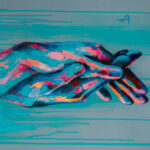A Tanzanian pastor, Moses, had died. Through his ministry, dozens of churches had been planted. He faithfully trusted God even when several sons died and when he had a motorbike accident, high blood pressure, a stroke, and diabetes. His mentor visited the home to comfort his widow, Mama Moses. What could the mentor say to bring comfort?
Why Am I Suffering?
Everyone seeks ways to understand and control the problems of life, especially the death of a loved one. In many parts of Africa, we expect that some person is responsible for our problems. We look for hints of a bad relationship to explain our troubles. At times, people go to diviners to find out who caused their sickness, death, or misfortune. The diviner might blame an invisible spirit (e.g. ancestor, genie) or the diviner might blame a witch, which is assumed to be a relative, neighbour or colleague—usually someone in a close relationship.
The Difference Between Witches and Diviners
Diviners are public persons who advertise their business. They claim to diagnose and heal people or help them find success. They use medicine as well as spiritual power from ancestors or spirits. Witches are very different from diviners. Witches are people who are thought to be able to cause misfortune, accidents, sickness, and even death through invisible means. Such people are therefore seen as evil.
The Bible forbids visiting mediums and diviners.
Although not all cultures in Africa and other parts of the world blame witches for problems, most cultures have people similar to diviners. In many cultures, magical and occult practices involve the spirit world and the world of the supernatural. The Bible is clear that Christians should not attempt to contact the dead or hear from the dead (Leviticus 19:31). Christians should not consult diviners or mediums (Leviticus 20:6). Christians should not make use of magic or witchcraft (Deuteronomy 18:10-11). Some needy Christians will be tempted, like king Saul under the cover of night (1 Samuel 28:3-19), to make secret visits to mediums and diviners. The Bible forbids this.
Furthermore, people will often envy, hate, and wish harm on others. They may try to harm others using physical weapons like guns or poison. Or they may try to harm others by using magic and witchcraft. The Bible says that Satan steals, kills, and destroys (John 10:10), so Satan loves it when people work to harm others through their actions or words. Christians can trust God to protect them (Psalm 118:6-7). In many societies, there is the belief that a person who sacrifices a child, or a person who uses witchcraft, will be able to achieve great wealth, power or political success. But God condemns all such practices (Deuteronomy 18:10-12).
We Must Trust God, for He Is in Control
The Bible says sickness, death, destructive weeds, infertility and lack of blessing came into the world because of the sin of Adam and Eve (Genesis 3:16-19). Suffering can also be caused by rebellious spirits (demons and Satan). God is in control. He will eventually use even suffering for his good purposes. Job suffered. Jesus suffered on the cross. The early Christians suffered. We should pray to God in our suffering and continue to trust him no matter what happens (James 5:10-16).
Jesus’ followers do not need to fear witches or even demons. We fear only God.
God alone has the power to heal, bless and reveal the future. Therefore, only God has the power to curse, allow sickness, and allow death. (See the story of Balaam, a pagan diviner, in Numbers 22-25.) Christians inherit the promise to Abram: God will bless them, make them a blessing, and curse those who curse them. Jesus’ followers do not need to fear witches or even demons. We fear only God. Therefore, we want to avoid sin. It is a biblical command and Christian practice to go only to God through Jesus for insight and healing. Do not go to other sources, such as diviners who consult ancestors or spirits and accuse witches.
The Label Can Be Very Harmful
What is the result of consulting spirits and blaming a person’s troubles on a witch? The result tends to be that people fear other people more and trust God less. The community gains confidence in the diviner, and they no longer trust the person who is accused of being a witch. They break relationship with the accused person. Gossip is spread. People may find more problems to blame on the person accused of being a witch. Eventually, this person may be neglected, ostracised, beaten, fined, or even killed by villagers. In some countries, people murder suspected witches publicly.
In some countries, people murder suspected witches publicly.
Usually, people who suffer abuse as suspected witches are people who have no one to defend them—women, widows, outsiders, poor people, old people, and increasingly stepchildren and orphans. Family, neighbours, and pastors should defend and care for these people. These are the very people whom God defends and cares for. Yes, he cares for widows, orphans and outsiders and commands us to do the same (Exodus 22:21-24; Deuteronomy 10:18-20; James 1:27). Even if they were our enemies, Jesus tells us to love our enemies (Luke 6:35).
As Moses’s mentor was about to leave, Mama Moses pulled him aside and told him not to trust a certain Pastor Joshua, because he had killed her husband! What should the mentor do with this accusation that his friend, Pastor Joshua, was a witch? Should he warn others? Should he avoid, fear, or confront Pastor Joshua? Must he correct Mama Moses for assuming Pastor Joshua was a witch?
We Must Be Very Slow to Call Someone a ‘Witch’
Murder accusations like Mama Moses’ accusation against Pastor Joshua require strong evidence. If others accept the charge, then they will act towards the accused in ways that are harmful. Fortunately, many of our countries have laws against witch accusations that lead to harm. Unfortunately, people often fear the invisible power of witches and accusers (who are often diviners) too much to enforce these laws that protect the vulnerable—widows and orphans, for instance. Laws also exist against harming with witchcraft, but a suspected witch is seldom taken to court because the evidence is not strong enough.
How would we know if someone were a witch? First, many of us have heard thousands of stories about witches. So we are tempted to believe that when a person dies, some other person must be responsible. We search for signs of envy and anger to know who might have a motive. We look for unusual circumstances. Sometimes a person dreams about witches. God can communicate through dreams, but not all dreams can be trusted to show us the truth (Jeremiah 23:32). Dreams can also lead us away from truth and God (Deuteronomy 13:1-5). Of course, people envy and hate. Some even believe in the power of witchcraft enough to put objects such as feathers, blood and fingernails somewhere, hoping to harm an enemy.
What About Confessions?
A person almost never claims to be a witch. Occasionally, a person will confess to being a witch if threatened or beaten, or possibly to make others fear him or her. Here is an experience from a senior pastor in West Africa:
“Years ago, my wife and I went to visit a young pastor who was sick and dying. He told us that his own daughter, who was about six years old at the time, was responsible for his sickness. We saw the small girl outside. She had been beaten with sticks, and a sharp razor blade had been used to lacerate her tender skin. After being beaten terribly, she confessed that she was responsible for the sickness and death of the mother and now her father as well.
Many so-called confessions are false.
The father later died. However, just before his death, he told his own family that he had HIV/AIDS. So it was definitely not true that the girl had caused the father to have HIV and AIDS, even though she had confessed. Actually, the father had been sleeping with prostitutes in the city and had contracted the deadly disease from them. This girl is now a woman who has lasting brain damage from the beatings. The point is that many so-called confessions are false.”
Should We Harm Confirmed Witches?
Often, a diviner is consulted to know who the witch is that caused harm. However, many diviners deceive people. At other times, diviners are deceived by the spirits speaking to them (Deuteronomy 18:9-22; Ezekiel 13; Acts 13:6-9). Today, diviners do not predict future events like biblical prophets. Instead, they just blame someone for a misfortune that has already occurred.
However, even if a diviner (or a scientist or a prophet) gives accurate predictions and performs miracles but then encourages worship of any god other than Yahweh, Deuteronomy 13 says God’s people must not listen to that person, and even that such a person should be put to death (Deuteronomy 13:5). This is how important it is to follow only the Lord, the life-giver.
There is no example where followers of Jesus are urged to harm other people, even to defend the faith.
Some people have used Exodus 22:18 to justify killing people suspected to be witches. A more accurate translation of Exodus 22:18 is “diviner”. However, in Jesus’ teachings and those of his followers, there is no example where followers of Jesus are urged to harm other people, even to defend the faith or deliver one from demonic activity. All the biblical examples of spiritual specialists are what we would call diviners today. They had public roles claiming to help people, assist the king, divine secrets, or use spiritual power in amazing and beneficial ways. For example, in many of our societies, there were spiritual specialists whom the chief or king relied on to use spiritual power for defence, including determining who was a witch. Pharaoh and the king of Babylon also had such people (see Exodus 7:11; Daniel 2:2; compare with Elymas in Acts 13:6-9).
The Bible also contains examples of godly people, such as Moses, Elijah, Elisha, Peter, and Paul, who announced God’s judgment. The judgements brought about everything from plaques to sudden death. These examples confirm that only God gives life or death, healing or sickness, blessing or no blessing. Sometimes the Bible recounts stories of prophets, diviners, and mediums who draw upon a source of power other than God to engage in supernatural activities. Such were the magicians in Pharaoh’s court (Genesis 41:8; Exodus 7:11,22). Many people were in awe of them. But the Bible shows that even the greatest diviners were ignorant and weak compared to the all-powerful God. They might turn a stick into a snake, but their powers were limited. These diviners and all their gods were not as powerful as Yahweh (Exodus 7:11).
The Bible shows many demonised people, but does not teach that a person with demons can send harm to another person. In the Bible, there is no one who fits what we think of as a witch. Ephesians 6:12 tells us that our struggle is not against humans—including witches—but against evil spiritual powers. Accusing people of being channels of Satan’s work is not something Jesus and his followers did.
Imitate Christ, Even If It’s Costly
Jesus and his disciples reached out to the vulnerable, marginalised, sick, and demonised in his society. When he met a person with a demon, he did not fear the person or the demon. He healed the oppressed person. He cast out the demon. Jesus walked towards a strong, naked, Gentile man living in a graveyard. He cast out the man’s many demons. But the community did not appreciate what Jesus did in freeing this man. They asked Jesus to go away (Luke 8:26-39). This was done because he had ruined their economy.
Jesus defended outcasts against their community and religious leaders.
Jesus served the outcasts and healed them. He defended them even against their community and religious leaders. He confronted those using religion to steal widows’ houses. Jesus scolded people who did not care for their parents. Today, some people do not care for parents or widows. In fact, some people even accuse a mother or widow of being a witch. Then they take all that belongs to the woman. Such people will stand before Jesus on the day he judges each person (Matthew 25:31-46).
Because Jesus served the weak people and outsiders, the religious leaders accused him of getting power from demons (Matthew 12:24). Actually, they were the ones partnering with the Accuser (the meaning of ‘Satan’). The envy and anger of the leaders who accused Jesus and the defence of their power led them to plot against Jesus. They used illegal court procedures and mob anger to have Jesus beaten, stripped, tortured and killed.
Protect the Vulnerable, Including Witches
This is exactly what many communities and religious leaders do today to people suspected of being witches. They say that chasing the witch from the community will take away evil, sickness and suffering. They say it is better for one to die to save the community. The difference is that in Jesus’ case, he was the true scapegoat (Leviticus 16:10), and his death did take away evil, sin, sickness and death. When a widow or child is beaten or killed, does Jesus care? Does he understand? Yes, he, too, was falsely accused, beaten, and killed.
We have no reason to fear because we know that carrying our cross will lead to eternal life.
We must follow the example of Jesus in defending widows, orphans, and the poor and vulnerable. “When you did it to one of the least of these, my brothers and sisters, you were doing it to me,” Jesus said (Matthew 25:40). Such a defence may be dangerous. As Jesus promised, we may be suspected, persecuted, or even killed. But we have no reason to fear because we know that serving and carrying our cross will lead to eternal life and joy. We know that Jesus is with us always.
In Tanzania, the mentor took the issue of accusation to the overseers. They met with Mama Moses to find out why she suspected Pastor Joshua. They asked her, “Who should you trust? The prophet with no reputation who accused Joshua of envying and killing your husband? Or Pastor Joshua, who your husband loved and trusted?” Pastor Joshua and his church have continued to show love to her. Now love, peace, and trust exist in their church.
Points to Remember:
- God alone has the power to give life, healing, blessing, success, and reveal the future. Satan’s attempts to do these things are perverted, distorted and deceptive. Trust only God through Jesus for insight and healing.
- Do not go to diviners. They consult spirits and accuse people of being witches. Never go to someone to find out if you are bewitched, even if the person who says they will divine your accuser is the head of a church and asks people to call him “pastor.”
- The Bible teaches that Satan or his agents cannot take the lives of children of God until they have completed their ministry (Revelation 11:7).
- Be careful about attributing spiritual powers to humans instead of the spiritual powers behind the humans who are demonised.
- If people come to you asking for prayer or advice because they are afraid that they have been bewitched, reassure them that the one who is within them is more powerful than any demonic power (1 John 4:4). Assure them that nothing can separate them from God’s love (Romans 8:35-39).
- Defend and care for widows, orphans, the poor and outsiders, even if people say they are witches and even if it costs you time and money.

The Africa Study Bible app is available on the Tecarta Bible App, the world’s best study Bible app, which is available to download on Google Play Store and Apple App Store.
Contact Oasis Regional Directors to order your Africa Study Bible:
- Regional Director East Africa: WhatsApp: +27 79 572 4877
- Regional Director West Africa: WhatsApp +234 809 111 1184














